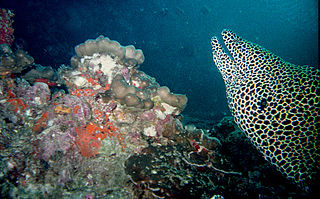Related Research Articles

An ecoregion or ecozone is an ecologically and geographically defined area that is smaller than a bioregion, which in turn is smaller than a biogeographic realm. Ecoregions cover relatively large areas of land or water, and contain characteristic, geographically distinct assemblages of natural communities and species. The biodiversity of flora, fauna and ecosystems that characterise an ecoregion tends to be distinct from that of other ecoregions. In theory, biodiversity or conservation ecoregions are relatively large areas of land or water where the probability of encountering different species and communities at any given point remains relatively constant, within an acceptable range of variation.
The Global 200 is the list of ecoregions identified by the World Wide Fund for Nature (WWF), the global conservation organization, as priorities for conservation. According to WWF, an ecoregion is defined as a "relatively large unit of land or water containing a characteristic set of natural communities that share a large majority of their species dynamics, and environmental conditions". For example, based on their levels of endemism, Madagascar gets multiple listings, ancient Lake Baikal gets one, and the North American Great Lakes get none.

The Solomon Islands rain forests are a terrestrial ecoregion covering most of the Solomon Islands archipelago.

Sundarbans is a mangrove area in the delta formed by the confluence of the Padma, Brahmaputra and Meghna Rivers in the Bay of Bengal. It spans the area from the Baleswar River in Bangladesh's division of Khulna to the Hooghly River in India's state of West Bengal. It comprises closed and open mangrove forests, land used for agricultural purpose, mudflats and barren land, and is intersected by multiple tidal streams and channels. Sundarbans is home to the world's largest area of mangrove forests. Four protected areas in the Sundarbans are enlisted as UNESCO World Heritage Sites, viz. Sundarbans West (Bangladesh), Sundarbans South (Bangladesh), Sundarbans East (Bangladesh) and Sundarbans National Park (India).

The Odisha semi-evergreen forests are a tropical moist broadleaf forest ecoregion of eastern India. The ecoregion covers an area of 8,600 square kilometers (3,300 sq mi) on the coastal plain of Odisha state, bounded by the Eastern Highlands moist deciduous forests west and north-west, transitioning from the huge ecoregion Lower Gangetic Plains moist deciduous forests along the north coastland, and surrounding the smaller ecoregion Godavari-Krishna mangroves along a stretch of the south-east coast by the Bay of Bengal.

The Western Indo-Pacific is a biogeographic region of the Earth's seas, comprising the tropical waters of the eastern and central Indian Ocean. It is part of the larger Indo-Pacific, which includes the tropical Indian Ocean, the western and central Pacific Ocean, and the seas connecting the two in the general area of Indonesia. The Western Indo-Pacific may be classified as a marine realm, one of the great biogeographic divisions of the world's ocean basins, or as a subrealm of the Indo-Pacific.
New Guinea, lying within the tropics and with extensive mountain areas, comprises a wide range of ecoregions. These include rainforests, grasslands and mangrove.

The Peninsular Malaysian rain forests is an ecoregion on Malay Peninsula and adjacent islands. It is in the tropical and subtropical moist broadleaf forests biome.

The Myanmar coastal rain forests is a tropical moist broadleaf forest ecoregion in Myanmar. The ecoregion occupies Myanmar's coastal lowlands along the Bay of Bengal and Andaman Sea.
References
- ↑ Wikramanayake, Eric; Eric Dinerstein; Colby J. Loucks; et al. (2002). Terrestrial Ecoregions of the Indo-Pacific: a Conservation Assessment. Washington, DC: Island Press
- ↑ Spalding, Mark D., Helen E. Fox, Gerald R. Allen, Nick Davidson et al. "Marine Ecoregions of the World: A Bioregionalization of Coastal and Shelf Areas". Bioscience Vol. 57 No. 7, July/August 2007, pp. 573–583